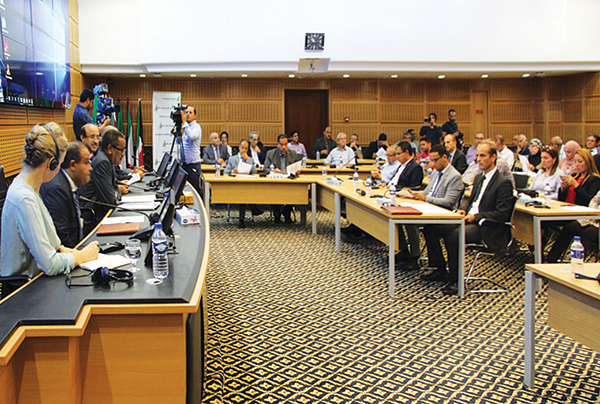Stakeholders from the Tunisian radio industry and broadcast experts from across the Arab world convened in Tunis last month to discuss the opportunities DAB+ brings to the radio, manufacturing, retail and automotive sectors. We bring you a detailed report
Hosted by the Arab States Broadcasting Union in partnership with WorldDAB, the workshop featured speakers from the Tunisian Ministry of Communication, the Ministry of Commerce, the National Broadcast Network Operator in Tunisia, and the Office National de la Télédiffusion (ONT), as well as representatives from the audiovisual regulator, retailers, receivers, car manufacturers and ASBU directors.
Abdelrahim Suleiman, Director General of the ASBU, opened the workshop by highlighting the importance of the digital revolution across the Arab states, touching on the Arab Spring and other key turning points in recent history that have brought about significant changes to the audiovisual industry in Tunisia and beyond.
He pointed out the benefits of a move towards DAB+ digital radio, particularly in terms of its offering more value-added services at a lower cost, emphasising that the time is now right for the radio industry to commit to a digital future.
Highlighting its reduced costs compared with FM broadcasts, and the growing number of DAB+ receivers available to consumers both in and out of the car, Suleiman stressed the importance of developing an Arab model for the rollout of digital radio, one that includes a suitable marketing strategy capable of convincing officials, introducing the technology to consumers and facilitating collaboration across the industry.
Also addressing the audience was Dhaker Baccouch, CEO of ONT, who confirmed that the digitisation of Tunisian radio is part of a national strategic plan to ensure additional services for broadcast, reduced costs and new opportunities for investment. He stressed that collaboration and coordination across government ministries, industry and commercial players would first require an increased number of listeners, and more importantly, increased education and interaction with the audience.
Baccouch reiterated the desire for the Independent High Authority for Audiovisual Communication (HAICA) to extend national services and have a total of 30 national DAB+ services on air by January 2021, and touched on the need for increased coordination and better use of frequency.
Sofian Jelili, Deputy Director of Implementation at ONT, spoke about a national multiplex that is already on air, covering 51% of Tunisia’s 11m inhabitants, while the second phase of the expansion – set to bring population coverage to 75% by July 2020 – is already underway.

The multiplex currently hosts 18 DAB+ stations and covers Tunis as well as other regions in the northeast of the country – including Ariana, Ben Arous, Nabeul, Sousse, Monastir, Manouba, Zaghouan, Bizerte and Mahdia – while the second phase will see DAB+ expand to cover four new sites, namely Ain Draham, Goraa (Beja), Trozza (Kairouan) and Ghraba (Sfax).
The importance of getting DAB+ in cars throughout Tunisia also featured among a number of key topics on the agenda, with the EU’s recent introduction of the EECC directive – which will require all new car radios in the EU to be capable of receiving digital terrestrial radio – referenced throughout the day to illustrate this point.
To that effect, Ibrahim Debache, CEO of Ennakl Automobiles, the official importer of VW brands in Tunisia, highlighted that DAB+ is an opportunity not only for the company, but for the wider automotive sector in a country in which 95% of transport is private, and where the percentage of new cars per year reaches 17%.
Pointing to the shifting consumer behaviour of car buyers, and their increasingly diverse expectations, including more interest in touchscreens and all things multimedia, Debache argued that Tunisian consumers are ready to reap the benefits of DAB+ digital radio – more stations and improved sound quality and reception, at no extra cost and with no subscription for the listener.
Hichem Snoussi, board member of HAICA, Tunisia’s audiovisual commission, acknowledged the benefits of DAB+ and stressed the importance of broadcasters being able to choose from various network operators, instead of relying on one single operator.
WorldDAB Project Director Bernie O’Neill also took the stage to present the audience with an update on the rollout of DAB+ from an international standpoint, emphasising the growing number of DAB+ stations in Europe (over 1,500 stations across 31 markets in the EBU area) and underlining the willingness and effort of Arab states (DAB+ trials on air in Algeria, Qatar and Bahrain, and regular services in Tunisia and Kuwait, among other countries) and countries in Southeast Asia (trials in Thailand, Indonesia and Vietnam) in driving DAB+ adoption.
WorldDAB France representative Jean-Marc Dubreuil discussed radio’s place in an increasingly IP-dominated world, and reiterated the importance of broadcasters retaining control over their audience in light of growing competition from tech giants.
Dubreuil also reiterated the benefits of DAB+ digital radio. Using Norway as an example, he emphasised listeners’ appetite for new and diverse content – as the first country to have completed a digital switchover, 35% of all listening in Norway is on new digital-only stations.
Highlighting the importance of educating listeners on the value of DAB+ digital radio, Dubreuil also reminded the audience of the free marketing toolkit available to manufacturers and retailers via the WorldDAB website, which can be used in promoting DAB+ in Tunisia and throughout the Arab world.
A useful case study on Italy’s successful rollout of DAB+ was outlined by the Director of DAB Italia Sergio Natucci, advising that the extreme congestion of FM in Italy has driven take-up of DAB+. With in-car radio listening particularly high, he advised that Italy has passed a law stating that from January 1, 2020, all devices sold to consumers by the automotive industry have to be capable of receiving digital radio.
In conclusion, Stan Baaijens, CEO of antenna manufacturer Funke NL, provided an overview of the challenges of including DAB+ in cars already on the road, and outlined some of the key lessons from other DAB markets that will be helpful to Tunisia as it progresses with the national rollout of DAB+.

















































































